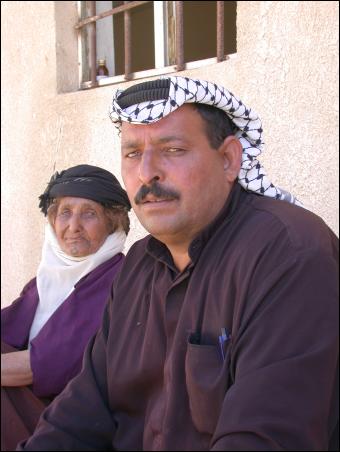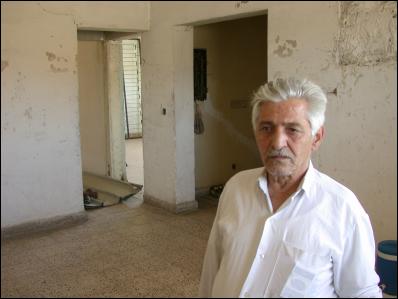Inside Iraq: Divide and dispossess
By James Addis
Divide and dispossess: Saddam Hussein’s ethnic policies favoured Arabs over Kurds but only succeeded in impoverishing them both. World Vision plans to bring both communities essential aid…

Fathi Mutar (above) is an Arab; Othman Pasim (below) is a Kurd but both have much in common. They live within 200 metres of each other and are victims of an “arabisation” policy, which left each of their large families homeless and impoverished.

The families now live in the grounds of Saddam Hussein’s northernmost presidential palace complex in Mosul, The luxury accomodation has been stripped bare and the palace walls are covered in anti-Saddam graffiti. The Mutars and the Pasims live among a collection of more humble buildings, set aside for the president’s guards. These places are also in a parlous condition. They have no furniture, running water, electricity or functioning toilets, but they are home to dozens of destitute families with no money and nowhere to go. Currently World Vision is registering such families and plans to bring them much needed aid.
The Mutars and Pasims do not have much to do with each other but they do not bear each other any ill will, which is rather surprising under the circumstances. Under the old regime “arabisation” meant forcing Kurds out of their homes and installing Arabs in their place. Today Kurds are attempting to return to their former houses and reclaim their land. The temptation for Balkan style racial hatred and persecution is extraordinarily strong. But so far ethnic flare-ups have been limited. Indeed, there is a realisation that old wrongs need to be righted, even by people who will lose out by pursuing justice.
Fathi Mutar, 41, best illustrates the point. When Saddam Hussein’s regime collapsed. He did not hang around waiting for the true Kurdish owners of the land he farmed in Gwer district to show up. He hired an enormous GMC Suburban, packed his family of 13 inside, and abandoned a bumper crop of wheat, almost ready to be harvested.
The truth is he was scared vengeful owners might kill his family. Fathi was fully aware how brutal “arabisation” had become and how aggrieved those original owners might be.
“Arabisation” was instituted in the late sixties as a means of installing more Arabs in Kurdish areas - an attempt to loosen Kurdish control and influence, particularly in oil-rich areas such as Kirkuk. In the beginning Kurds were compensated and offered places to re-settle. But as relations between the Hussein regime and the Kurds deteriorated during the eighties, such niceties were abandoned. Kurds were abruptly told to clear out and in many cases did not even have the opportunity to gather together their possessions.
After his discharge from the army, Fathi and his young family were settled on Kurdish land. Fathi never felt comfortable with the arrangement but felt powerless to do anything about it.
“We did not have any money at the time so we went,” he explains, “we were taking orders from the government and nobody could argue. They kept saying Iraq is one piece of land that belongs to everybody.
“They said settle. And if the authorities told you to settle somewhere that’s exactly what you did.”
So Fathi did what he was told and for five years he and his wife raised their eleven children and looked after his elderly mother. They were certainly not rich by Western standards but each year they could look forward to a reasonable harvest. This year the harvest looked especially good – Fathi estimates it may have been worth 30 million Iraqi dinar ($30,000). But he will never know for sure. His hasty departure means the wheat is either rotting in the fields or being harvested by somebody else. It’s a familiar story in villages all over northern Iraq.
Indeed, instead of enjoying the fruits of their labour, Fathi’s family endure miserable, unsanitary conditions, his children regularly pick up skin infections and one child is in hospital with diarrhoea.
But despite the sudden plunge in his family’s fortunes, Fathi does not utter one word against the Kurds now reclaiming their land.
Frankly, the land belongs to the Kurds. If I were in their position I would feel exactly as they do. I would want my land back too,” he says.
“But it’s a great loss when you leave your home and everything you have worked for,” he says shrugging his shoulders, “but what can I do?”
Kurd Othman Pasim, 59, knows just how he feels. Saddam’s palace is on the same land that was once occupied by his village. A village inhabited by Kurds, Arabs and Turkomans.
When Othman’s village was dismantled to make way for re-development, Arabs were compensated for the loss of land; Turkomans and Kurds got nothing. Othman, suffering failing health and a nagging heart condition, went to live in Mosul.
For the last 25 years he’s lived in rental properties and, unable to work, watched his standard of living plummet along with the rest of Iraq’s economy. Like thousands in Mosul he can no longer afford to rent. When he heard about the defunct guard rooms near the palace, partly from necessity and partly because he grew up in the area, he decided to move his family in.
Like Fathi, Othman has a big family – 9 children. And also like him shares the same fate - no place for his family to call home.
When asked about Arabs like Fathi, who for many years enjoyed preferential treatment, Othman has no axe to grind. Instead he recalls wistfully the harmonious relations that existed in former times in his ethnically diverse village.
“We all lived peacefully,” Othman recalls, “there were no problems between us at all. But later Saddam created problems. Some would join the Baath party and there would be antagonism. His influence was like a cancer polluting relations between different peoples.”
But today Othman identifies with Fathi strongly
because each shares exactly the same fear. It is the fear of
homeless, rootless people the world over. That it won’t be
long before there is a knock on their respective makeshift
doors and an angry man telling them to clear out and move
on.


 Eugene Doyle: Writing In The Time Of Genocide
Eugene Doyle: Writing In The Time Of Genocide Gordon Campbell: On Wealth Taxes And Capital Flight
Gordon Campbell: On Wealth Taxes And Capital Flight Ian Powell: Why New Zealand Should Recognise Palestine
Ian Powell: Why New Zealand Should Recognise Palestine Binoy Kampmark: Squabbling Siblings - India, Pakistan And Operation Sindoor
Binoy Kampmark: Squabbling Siblings - India, Pakistan And Operation Sindoor Gordon Campbell: On Budget 2025
Gordon Campbell: On Budget 2025 Keith Rankin: Using Cuba 1962 To Explain Trump's Brinkmanship
Keith Rankin: Using Cuba 1962 To Explain Trump's Brinkmanship